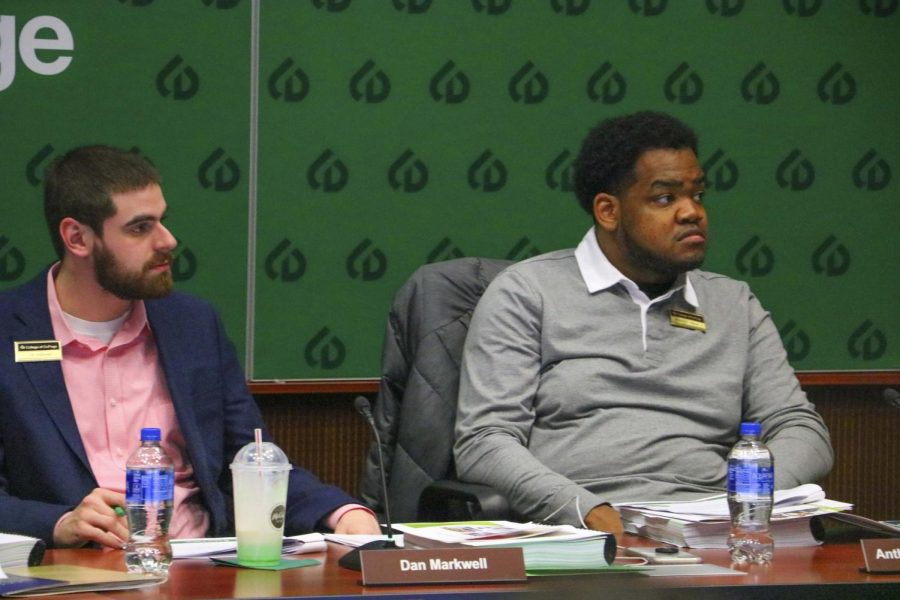Tuition to increase after a three-year freeze
Trustee Dan Markwell and Student Trustee Anthony Walker at Thursday’s BOT meeting
March 20, 2018
Trustees at the College of DuPage (COD) voted 5-3 to approve a $1 per credit hour increase in tuition for the fall 2018 semester at the March 15 regular board of trustees meeting.
The vote raises tuition to $136 for In-District students, $323 for Out-of-District students and $393 for Out-of-State and International students.
Trustees Charles Bernstein (Wheaton), Christine M. Fenne (Wheaton), Alan L. Bennett (Lombard), Frank Napolitano (Bloomingdale), and Deanne Mazzochi (Elmhurst) voted for the proposed increase to avoid a “structural imbalance.”
Although his vote was nonbinding, Student Trustee Anthony Walker (Bensenville) voted against the proposal along with Trustees Dan Markwell (Lombard) and Joseph C. Wozniak (Naperville).
The college’s financial position is strong because of plentiful “rainy day” reserves but COD is expected to spend big money on earmarked Guided Pathways projects and other construction projects in the near future. College employee salaries are also expected to increase over the next fiscal period.
COD didn’t increase its tuition rates for three years in a row. For FY 2016-2018, trustees used funds from the college’s reserves to close an expected budget gap.
Even with the $1 increase, students will still pay less next year than they paid in 2014. The college in 2014 increased tuition by $4 and In-District students paid $144 per credit hour. For the Fiscal Year 2016, the college reduced tuition by $9 to $135 per credit for District 502 students.
“Tuition rates going down, costs going up and drawing down funds balances, this kind of situation can’t continue indefinitely,” said Brian Caputo, vice president for administration and treasurer at COD. “This is an overall step for the financial stability of the college.”
As the college’s chief financial officer, Caputo believes a “gradual” tuition increase is a way COD can offset what it spends on operating expenses that benefit students at the college.
“If something isn’t done with tuition gradually and going forward, the college is looking at substantial increases as we drawdown for various capital projects and other initiatives that the college is planning on carrying out,” added Caputo.
The college expects the $1 increase to bring in an estimated $500,000 in revenue over the next fiscal period. Despite this increase, the college is expected to receive $78.6 million from tuition and fees; this is about $4 million less than the total revenue from tuition and fees in the current budgetary period. The drop is foreseeable given a two-year, 4-percent decrease in enrollment. COD generates about 24 percent of its revenue from tuition.
Trustees who voted against the proposal to increase tuition took into account the cost of tuition as the main reason many students attend COD.
“While I understand that it is only a $1 per credit hour increase, the cost of college is the most important factor to our students at the college,” said Markwell.
Stating his reason for rejecting the tuition proposal, Student Trustee Walker argued the student body wasn’t aware of any tuition increase before Thursday’s meeting.
“The fact that there was limited to no prior communication on this proposed increase, I will also be inclined to vote no on this item,” said Walker. “We are shown what happens when tuition goes up by a dollar; we aren’t shown what is going to happen if we go back to the drawing board and explore more options.”
Like Walker, Trustee Wozniak felt relevant stakeholders didn’t have enough time to peruse the tuition proposal. This point was brushed off when he made a statement about the “clean slate” about what he termed as “extra spending.”
“I happen to note that since the ‘clean slate’ took place, they have done a lot of things that have cost the college a lot of money,” said Wozniak. “Now are talking about $500,000; this should not be on the back of the students.”
Trustees Mazzochi, Napolitano and Bernstein campaigned and won seats on the board of trustees in 2015 as a “clean slate.” The trio promised voters to institute sound financial policies at COD.
Prior to 2015, Wozniak voted for two tuition hikes. Wozniak then voted against tuition reductions in 2016 and 2017.
“I want to understand the thought process there,” said Vice Chairman Napolitano, referencing Wozniak’s voting history.
On the flip side, the president of the faculty association, Richard Jarman, who frowned against last year’s attempt to increase tuition, was on board with the $1 increase.
“The modest $1 increase seems reasonable,” said Jarman.
The decision to increase tuition comes days after Standard and Poor’s, a leading provider of credit ratings, revised COD’s bond rating from “AA” to “AA+” and cited positive financial operations at the college. This means COD can borrow money at a lower interest rate and lower overall cost.




















